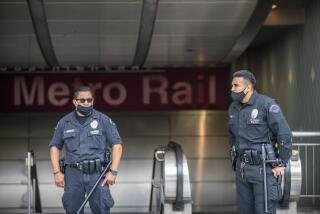MTA exhorted to get tough on legal costs
- Share via
Alarmed by soaring legal costs at the Metropolitan Transportation Authority, a state legislator has called on the giant transit agency to review its litigation practices and finally heed the recommendations of a 2004 state audit.
In a letter sent this week to MTA Chief Executive Arthur T. Leahy, Assemblyman Hector de la Torre (D-South Gate) said he was concerned that the agency’s legal costs had surged more than 200% since 1995 and that MTA officials had brushed off suggestions from the state auditor to improve the oversight of contracts.
De la Torre specifically mentioned a 15-year-old legal battle with subway contractor Tutor-Saliba, which has been accused of cheating the MTA out of millions of dollars during construction of the Red Line. The case has cost the MTA more than $34 million, although the most the agency could win in damages would be half that amount.
“This issue is particularly troubling because the MTA faces an operating deficit and is set to embark on a historic, voter-approved $40-billion campaign to expand mass transit and improve roads throughout Los Angeles County,” De la Torre wrote. “Taxpayers must be assured that MTA is using its funding appropriately.”
De la Torre chairs the Assembly’s accountability and administrative review committee, which oversees the use of state funds.
MTA spokesman Rick Jager said De la Torre’s concerns would be addressed in the months ahead by the agency’s inspector general, who was ordered by the Board of Directors in February to audit the management of legal costs. The office is expected to report back to the board by June.
Jager added that the findings and recommendations of the 2004 audit would probably be addressed during the review. State officials found that the MTA’s legal costs rose about 200% between 1995 and 2004 and that the management of contracts involving private law firms, which amounted to more than half the agency’s legal costs, was lax.
To help contain costs, the audit recommended that when special lawyers need to be hired, they should be required to prepare detailed budgets, litigation plans and invoices that would be reviewed by the MTA and the county counsel’s office to make sure they adhered to billing requirements. Auditors further suggested that those lawyers get written approval to use consultants and expert witnesses.
De la Torre praised the MTA’s recent decision to review its legal costs but said it was still necessary to heed the advice of the state’s 6-year-old audit. The failure to adopt its recommendations, he wrote, “was a missed opportunity to improve financial oversight and one that is now costing taxpayers.”
More to Read
Sign up for Essential California
The most important California stories and recommendations in your inbox every morning.
You may occasionally receive promotional content from the Los Angeles Times.














